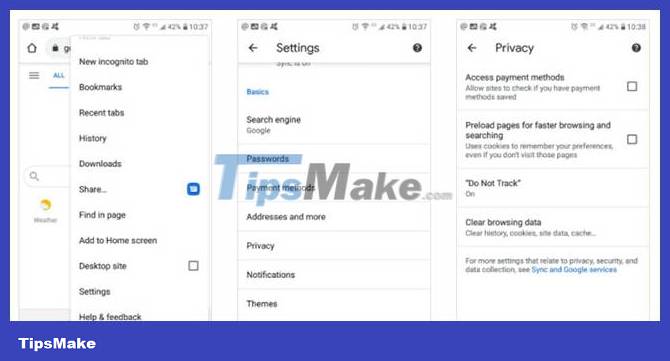Is WiFi or mobile data more secure?
Protecting privacy and digital security are things that should be top of mind for everyone. More and more sensitive data is being carried around and accessed continuously around the world. And more and more people around the world are accessing data through open WiFi networks.
Whether you're making a payment or sending a message, is it safer to use WiFi or mobile data?
Privacy and security
Most people consider privacy and security to be interchangeable terms. However, they actually have different meanings. Some connections focus on security, others focus on privacy, both security and privacy, or nothing at all.
Security
Security means that people outside the network, such as hackers, cannot see your actions. In general, operating with the highest security means understanding what types of connections you are using.
Usually, some level of security is important. The level of importance depends on the type of information you are accessing or entering.
If you're updating your debit card balance, you need a secure connection. If you want to check to see if an actor was actually in some old movie, you can risk using a less secure connection. In short, you have to be careful with how you access sensitive data.
Privacy
Privacy means that network actors cannot see your actions, such as the websites you use or the applications on your device. Operating with the utmost privacy means understanding the terms and conditions of the providers, websites and applications you visit, and how you use them.
There are some actions on the web that wouldn't work if they were completely private. That's why terms and conditions for websites and applications are so important.
Some websites and apps require access and sometimes data sharing permissions to function as expected. You just need to know who has access to what data, why they need it, how they use it, and who they share it with (if at all).
Learn about mobile connections

There are two basic types of Internet connections for mobile devices. Both allow connections in essentially the same way. However, how devices connect and who can see their activity on those connections varies.
WIFI
WiFi is a wireless Internet connection created by a router connected to a modem. The modem actually creates the network through the service provider and router allowing mobile devices to connect wirelessly. That means your internet service provider (ISP) has access to almost everything you're doing online.
If you are in control of your network, you can control this to some extent by using systems such as Tor and/or VPN. However, if you are on someone else's network, things are not so simple.
When you access a WiFi network, it opens or closes. Closed networks, like the one you use at home or at work, require a password. Open networks, such as those at some restaurants and other public places, do not require passwords. If you're particularly concerned about your privacy and security, this is a problem, for two main reasons.
- First, you don't know anyone else online or what they are capable of.
- Second is that many mobile devices are set to automatically connect to open WiFi, so you may be exposed to some risk even if you are not actively making sensitive transactions on your device.
If you're worried about your device automatically connecting, you can adjust that in your device settings.
Mobile data
Mobile data essentially works like WiFi. The biggest difference is that the signal comes through the cell service provider and not the ISP.
Sure, mobile carriers may still have access to some of your information. And again, so will the websites you visit (and the websites where the provider shares/sells your data). However, unlike WiFi connections, mobile data connections are encrypted, adding an extra level of security against outside threats.
That's why security experts like Norton recommend using mobile data instead of WiFi to access sensitive information when you're out and about.
"Instead of WiFi" doesn't just mean "turn on mobile data", it also means "turn off WiFi". Most mobile devices will use WiFi instead of data, when WiFi is available and both connections are enabled.
Other security tips
Norton also says that no connection is completely secure. That's even true if you're using mobile data. However, there are some things you can do to make your interactions on the mobile web more secure.
Data management
Most mobile plans have limited data. Even most "unlimited" plans will "save" your data. That means, after you use a certain amount of data, you still have access to the data but it's a slower form of data. So check your mobile plan to see how much data you have and what happens after it runs out.
As mentioned above, not everything the average person does on the Internet needs to be secure or even private. So consider saving data to do things like check your bank account, and use an open WiFi connection to do things like search for a quote.
Be careful with cookies
Some people are afraid of cookies. You shouldn't be afraid of cookies and should learn about them. Cookies store information on the websites you visit.
That might sound scary, but most websites keep cookies pretty secure, and information saved on one website isn't available to other websites you visit. If you're really worried about cookies, you can manage them in your browser settings. The following images show what Google Chrome looks like, but most browsers are quite similar.

Because cookies are maintained by the websites that manage them, they are a potential privacy issue rather than a security issue. In other words, you're not in danger from cookies on your mobile data or WiFi like you are with any other connection, and hackers can't actually access or use your cookies.
More important than protecting cookies is thinking carefully about the sites where you enter potentially sensitive information. Or, more safely, think carefully about the websites you visit.
Use two browsers or apps
What's perhaps scarier than cookies is that these days, most browsers save your passwords. If you turn this setting on (and most people do) the hackers will get even more information.
There are several ways to solve this problem. One is to set your browser so it doesn't remember passwords for websites with sensitive information like mobile banking accounts. The alternative is to use a separate dedicated application if possible.
Going back to the example of mobile banking account access, if your banking service has a dedicated app then accessing the service through that app is (possibly) more secure than through Browser. Even if the app isn't more secure, using an alternative app can keep passwords for sensitive content out of the browser.
A similar but possibly simpler solution is to use two different browsers. It's a browser for less sensitive activities (casual browsing, streaming, social networking, etc.) and a browser for more sensitive activities (online banking, online shopping, email, etc.).
You can use a standard browser like Chrome or Safari for less sensitive actions, and a dedicated secure browser like Tor for sensitive activities. Or, just use two different standard browsers for both types of operations just to prevent mixing passwords and data.
Finally, when you're out and about, this method works especially well with the previous approach regarding data management. Use a dedicated secure browser on your data connection and use WiFi to access the standard browser.
See more: